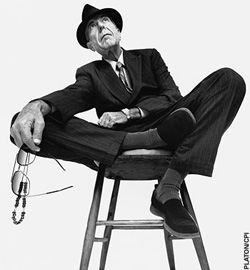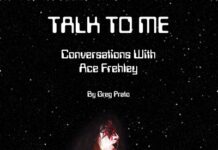Watching Leonard Cohen sing with U2 in the documentary I’m Your Man brings one a catechism of immeasurable delight, a divine connection of art and communion: Irish/Canadian, Christian/Hebrew, outward/inward, ballyhoo/ballyho, Yeats/Lorca, punk/zen. The big weep absolving into the cathedral of joy, emancipating the beauty like post modern Thelonious Monks, responding and resonating in the gallows of truth.
Leonard Cohen and his mysterious Mandela deciphering codes and collecting curios through the marvelous lunatic synagogue of the interior; the zendo zymurgizing haunted orpheus, stalking the tower, the predicament and the silence of Hank Williams; Cohen the cubist, the revolutionary, the existential fur trapper, the exquisite jazz hunter coyly in on the ruse; Commander Cohen in Jerusalem on psychedelics receiving habbakuk like uber visions, the six-plumed bird of paradise engaging in the ritual of pomp, circumstance and the all-consuming boola boola; the Jewish Canadian Sinatra cloistered in robes and ritual, suspended in the mystic opera of bohemia.
Nineteen sixty-seven saw the deaths of jazz prophet John Coltrane and Latin-American revolutionary Che Guevara. It was also the year of Leonard Cohen’s debut album, Songs Of Leonard Cohen, a collection of ambiguous, poetic soul hymns full of mood, shade and mystery. The proceedings begin with the romantic bewilderment of “Suzanne,” a song of rivers and lovers, Jesus and salvation and the enigmatic lady of the harbor; a song that connects spirit and flesh in hushed Sanctus Dominus.
This is followed by “Master Song” where Cohen explores the tension in the temple of fidelity, that fractured grace that gropes for the wind in dark minor desperation. In “Sisters Of Mercy,” a grateful ember of selflessness and compassion is bestowed upon the narrator. A consecration of the sacred feminine, but as is with many Cohen songs, the voluptuous asceticism morphs into erotic saudade, his voice hovering somewhere between Johnny Cash and Egon Schiele — seducing, scaring and comforting in ecclesiastical bacchanalia, a sensuous panic of obscure theological dilemma.
The messianic blues of “So Long, Marianne” is fragrant with clarion and catastrophe as the ghost of Pessoa hovers through stories of the street with one hand on the suicide and the other hand on the rose. There is also exotic pleasure, suffering, wars and mask, hexagrams and wishing wells and a secret place where Satori and Duende confide.
In “Teachers,” the swift dangle of arpeggio surveys a man seeking a teacher of the heart, across the great expanse of the sea inside. The drone of supplication and questions piled upon questions; a mysterious doctor, suicidal saint and disturbed Eskimo occupy the intricate mental topography of one of us cannot be wrong — another of Cohen’s intricately, twisted affairs of the heart.
The expanded edition of Songs Of Leonard Cohen features two bonus tracks: “Store Room,” a galloping Lee-Hazelwood-cum-Ennio-Morricone round-up, and “Blessed Is The Memory,” which finds Cohen as the concerned observer of war, loss and human frailty.
Nineteen sixty-eight is the year in which Cohen released his second album, Songs From A Room. It is a work that sees Cohen’s lyrical scope widen to a vigorous blend of Robinson Jeffers and Federico Garcia Lorca. Beginning with a paean to betrayal, contradiction and the complexity of freedom, “Bird On A Wire” is a pub song of immense decor and beauty — “Like a bird on a wire/Like a drunk in a midnight choir/I have tried in my way to be free…” It’s been said that Kris Kristofferson plans on using these lyrics as his epitaph.
“Story Of Isaac” hears Cohen’s voice tremble in the biblical convergence of madness and faith, seeking worldly wisdom out of otherworldly paradox. The grand experimentalist in Cagean chance operation, sniffing out the elusive on cloud riff and samurai, soul deep in Zohar and Magma like Cocteau’s holy terror in the shadow of irreconcilable reconciliations, constantly in some sort of dialogue or prayer, raging in the mania of human juxtaposition, the rabbinical Jungian post-modern basho sipping cognac with Ariel Sharon in the Sinai — with that eagle that might be a vulture and the farther that might be a murderer, a stark barrier reef of temptation, fear and faith.
The vagaries of romantic entanglement are unveiled in “Seems So Long Ago, Nancy.” The Tuaregs of West Africa have an untranslatable word (“oosa”) that roughly means loneliness and nostalgia. Through the prism of investigation, the narrator seems to be caught in the grip of this complex emotion. Is Nancy a prostitute swept up in the web of political intrigue? A suicide angel sacrificing herself to comfort others in crisis? Or a befuddled sybarite trapped in the tumult of her time? The old revolution is Cohen’s Dantean ode to self revelation, a hymn to the war torn, basking in a Celtic gospel melancholy where damnation is poisoned with rainbows and the eidolon of William Butler Yeats — subtle murmurs, psychic enterprise, Sisyphean balderdash and bashful human shadows.
Cohen then discovers recognition with his “Lady Midnight,” a song that probes, argues and cajoles as it courses through the pageantry of pen and purgatory. As Songs From A Room closes its door with “Tonight Will Be Fine,” one comes to experience a depth of emotion that has rarely been probed or examined with such zeal and intellectual vitality. An alternate version of “Bird On A Wire” fills out the reissued expanded version of this CD with an exuberance and slyness that only Cohen can summon.
Songs Of Love And Hate, originally released in 1970, is another collection of soul probings, Hasidic conundrums and nocturnal homilies. “Avalanche” consummates the proceedings with a wild Spanish guitar as Hunchback Moses reveals a litany of difficult wisdoms and truths — “You who wish to conquer pain/Must learn what makes me kind/ The crumbs of love that you offer me/They’re the crumbs I’ve left behind.” Cohen’s voice is cavern-like and draped in a dark beauty of cellos, violas and violins adorned for apocalyptic cabaret. “Last Year’s Man” is filled with odd biblical imagery culled from that hidden pregnant chamber buried in the ether of enigma. Then there is the esoteric optimism of “Famous Blue Raincoat,” a moody fever dream that occupies the narrator in winter on Clinton Street; a difficult three-way affair that lurks toward disaster.
“Sing Another Song, Boys” is the kind of revelry one might hear a group of drunken sailors sing in some far-flung pub off the coast of Wales until the words about the money lender’s lovely little daughter eaten with desire tempts some poor singer with clarinets and a Nazi dagger. But on planet Cohen, this is just another entanglement in his bedeviled tower of song. The album signs off with “Joan Of Arc,” a John Donne-like romantic elegy full of fire, ash and poetic pathos concluding with the bittersweet denouement, “Myself I long for love and light/But must it come so cruel, and oh so bright?”
And with that, the mysterious curtain comes down on Leonard Cohen’s first three albums. The velvet pantomime in repose, and the artist retreating back to his solitude and wanderlust — dreaming again, aching again, hoping again, seeking panic and rapture in the catechism of immeasurable delight.
Lanny Cordola




















